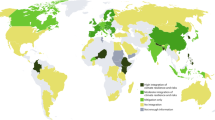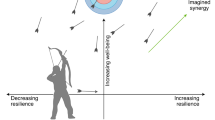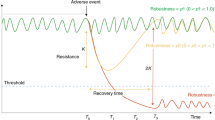Abstract
We review the past decade’s widespread application of resilience science in sustainable development practice and examine whether and how resilience is reshaping this practice to better engage in complex contexts. We analyse six shifts in practice: from capitals to capacities, from objects to relations, from outcomes to processes, from closed to open systems, from generic interventions to context sensitivity, and from linear to complex causality. Innovative complexity-oriented practices have emerged, but dominant applications diverge substantially from the science, including its theoretical and methodological orientations. We highlight aspects of the six shifts that are proving challenging in practice and what is required from sustainability science.
This is a preview of subscription content, access via your institution
Access options
Access Nature and 54 other Nature Portfolio journals
Get Nature+, our best-value online-access subscription
$29.99 / 30 days
cancel any time
Subscribe to this journal
Receive 12 digital issues and online access to articles
$119.00 per year
only $9.92 per issue
Buy this article
- Purchase on Springer Link
- Instant access to full article PDF
Prices may be subject to local taxes which are calculated during checkout


Similar content being viewed by others
References
Leach, M. et al. Equity and sustainability in the Anthropocene: a social–ecological systems perspective on their intertwined futures. Glob. Sustain. 1, e13 (2018).
Elmqvist, T. et al. Sustainability and resilience for transformation in the urban century. Nat. Sustain. 2, 267–273 (2019).
Allen, C. R., Angeler, D. G., Chaffin, B. C., Twidwell, D. & Garmestani, A. Resilience reconciled. Nat. Sustain. 2, 898–900 (2019).
Chaigneau, T. et al. Reconciling well-being and resilience for sustainable development. Nat. Sustain. 5, 287–293 (2022).
Clark, W. C. & Harley, A. G. Sustainability science: toward a synthesis. Annu. Rev. Environ. Resour. 45, 331–386 (2020).
Folke, C. Resilience (republished). Ecol. Soc. 21, 44 (2016).
The resilience of the resilience debate. Nat. Sustain. 2, 887 (2019).
Constas, M. A., Mattioli, L. & Russo, L. What does resilience imply for development practice? Tools for more coherent programming and evaluation of resilience. Dev. Policy Rev. 39, 588–603 (2021).
Transforming Our World: The 2030 Agenda for Sustainable Development (United Nations, 2015).
Davidson, J. L. et al. Interrogating resilience: toward a typology to improve its operationalization. Ecol. Soc. 21, 27 (2016).
Holling, C. S. Resilience and stability of ecological systems. Annu. Rev. Ecol. Syst. 4, 1–23 (1973).
Levin, S. et al. Social–ecological systems as complex adaptive systems: modeling and policy implications. Environ. Dev. Econ. 18, 111–132 (2013).
Reyers, B., Folke, C., Moore, M. L., Biggs, R. & Galaz, V. Social–ecological systems insights for navigating the dynamics of the anthropocene. Annu. Rev. Environ. Resour. 43, 267–289 (2018).
Lade, S. J., Walker, B. H. & Jamila Haider, L. Resilience as pathway diversity: linking systems, individual, and temporal perspectives on resilience. Ecol. Soc. 25, 19 (2020).
Fikret, B., Colding, J. & Folke, C. Navigating Social–Ecological Systems: Building Resilience for Complexity and Change (Cambridge Univ. Press, 2003).
Bodin, Ö. & Tengö, M. Disentangling intangible social–ecological systems. Glob. Environ. Change 22, 430–439 (2012).
Schlüter, M. et al. Capturing emergent phenomena in social–ecological systems: an analytical framework. Ecol. Soc. 24, 11 (2019).
Folke, C. et al. Resilience thinking: integrating resilience, adaptability and transformability. Ecol. Soc. 15, 20 (2010).
Sellberg, M., Quinlan, A., Preiser, R., Malmborg, K. & Peterson, G. Engaging with complexity in resilience practice. Ecol. Soc. 26, 8 (2021).
Schipper, E. L. F., Eriksen, S. E., Fernandez Carril, L. R., Glavovic, B. C. & Shawoo, Z. Turbulent transformation: abrupt societal disruption and climate resilient development. Clim. Dev. 13, 467–474 (2021).
Preiser, R., Biggs, R., De Vos, A. & Folke, C. Social–ecological systems as complex adaptive systems: organizing principles for advancing research methods and approaches. Ecol. Soc. 23, 46 (2018).
Bahadur, D. A., Lovell, E. & Pichon, F. Effectiveness in Building Resilience: Synthesis report for Oxfam’s Resilience Outcome Area (Oxfam International, 2016).
Sagara, B. & Hudner, D. Enhancing Resilience to Severe Drought: What Works? (Mercy Corps, 2017).
Bower, T. et al. Shocks, Resilience Capacities and Response Trajectories Over Time (ILRI and TANGO International, 2016).
Leavy, J., Boydell, E., McDowell, S. & Sladkova, B. Resilience Results: BRACED Final Evaluation (BRACED, 2018).
Haider, L. J., Schlüter, M., Folke, C. & Reyers, B. Rethinking resilience and development: a coevolutionary perspective. Ambio 50, 1304–1312 (2021).
Manyena, B., Machingura, F. & O’Keefe, P. Disaster resilience integrated framework for transformation (DRIFT): a new approach to theorising and operationalising resilience. World Dev. 123, 104587 (2019).
Eriksen, S. et al. Adaptation interventions and their effect on vulnerability in developing countries: help, hindrance or irrelevance? World Dev. 141, 105383 (2021).
Siders, A. R. Adaptive capacity to climate change: a synthesis of concepts, methods, and findings in a fragmented field. Wiley Interdiscip. Rev. Clim. Change 10, e573 (2019).
Bahadur, A. V. et al. The 3 As: Tracking Resilience Across BRACED (ODI, 2015).
Jeans, H., Castillo, G. & Thomas, S. Absorb, Adapt, Transform: Resilience Capacities (Oxfam International, 2017).
Levine, E., Vaughan, E. & Nicholson, D. Strategic Resilience Assessment Guidelines (Mercy Corps, 2017).
Haggard, R., Cafer, A. & Green, J. Community resilience: a meta-study of international development rhetoric in emerging economies. Community Dev. 50, 160–180 (2019).
Wolfram, M., Borgström, S. & Farrelly, M. Urban transformative capacity: from concept to practice. Ambio 48, 437–448 (2019).
Hooli, L. J. Resilience of the poorest: coping strategies and indigenous knowledge of living with the floods in Northern Namibia. Reg. Environ. Change 16, 695–707 (2015).
Moore, M. L., Olsson, P., Nilsson, W., Rose, L. & Westley, F. R. Navigating emergence and system reflexivity as key transformative capacities: experiences from a global fellowship program. Ecol. Soc. 23, 38 (2018).
Reed, S. O. et al. Resilience projects as experiments: implementing climate change resilience in Asian cities. Clim. Dev. 7, 469–480 (2015).
Béné, C. et al. Is resilience socially constructed? Empirical evidence from Fiji, Ghana, Sri Lanka, and Vietnam. Glob. Environ. Change 38, 153–170 (2016).
Coetzee, C., Van Niekerk, D. & Raju, E. Reconsidering disaster resilience: a nonlinear systems paradigm in agricultural communities in Southern Africa. Nat. Hazards 90, 777–801 (2018).
Darnhofer, I., Lamine, C., Strauss, A. & Navarrete, M. The resilience of family farms: towards a relational approach. J. Rural Stud. 44, 111–122 (2016).
Few, R., Morchain, D., Spear, D., Mensah, A. & Bendapudi, R. Transformation, adaptation and development: relating concepts to practice. Palgrave Commun. 3, 17092 (2017).
Fischer, A. & McKee, A. A question of capacities? Community resilience and empowerment between assets, abilities and relationships. J. Rural Stud. 54, 187–197 (2017).
Herrfahrdt-Pähle, E. et al. Sustainability transformations: socio-political shocks as opportunities for governance transitions. Glob. Environ. Change 63, 102097 (2020).
Priming Resilience with Intra-household Change (Mercy Corps, 2018).
Ansah, I. G. K., Gardebroek, C. & Ihle, R. Resilience and household food security: a review of concepts, methodological approaches and empirical evidence. Food Secur. 11, 1187–1203 (2019).
Smith, L., Frankenberger, T. & Nelson, S. Ethiopia Pastoralist Areas Resilience Improvement and Market Expansion (PRIME) Project Impact Evaluation: Endline Survey Report (TANGO International, 2019).
Barrett, C. B. & Constas, M. A. Toward a theory of resilience for international development applications. Proc. Natl Acad. Sci. USA 111, 14625–14630 (2014).
Bouwer, R., Pasquini, L. & Baudoin, M. A. Breaking down the silos: building resilience through cohesive and collaborative social networks. Environ. Dev. 39, 100646 (2021).
Sawatzky, A. et al. “It depends…”: Inuit-led identification and interpretation of land-based observations for climate change adaptation in Nunatsiavut, Labrador. Reg. Environ. Change 21, 54 (2021).
Thompson, K.-L., Hill, C., Ojeda, J., Ban, N. C. & Picard, C. R. Indigenous food harvesting as social–ecological monitoring: a case study with the Gitga’at First Nation. People Nat. 2, 1085–1099 (2020).
Derbyshire, S. F., Nami, J. E., Akall, G. & Lowasa, L. Divining the future: making sense of ecological uncertainty in Turkana, Northern Kenya. Land 10, 885 (2021).
Fuller, R. & Lain, J. Building Resilience: A Meta-analysis of Oxfam’s Resilience Effectiveness Reviews (OXFAM, 2017).
Nabavi, E., Daniell, K. A. & Najafi, H. Boundary matters: the potential of system dynamics to support sustainability? J. Clean. Prod. 140, 312–323 (2017).
White, S. C. Relational wellbeing: re-centring the politics of happiness, policy and the self. Policy Polit. 45, 121–136 (2017).
Jepson, W. et al. Advancing human capabilities for water security: a relational approach. Water Secur. 1, 46–52 (2017).
West, S., Haider, L. J., Stålhammar, S. & Woroniecki, S. A relational turn for sustainability science? Relational thinking, leverage points and transformations. Ecosyst. People 16, 304–325 (2020).
Walsh, Z., Böhme, J. & Wamsler, C. Towards a relational paradigm in sustainability research, practice, and education. Ambio 50, 74–84 (2021).
Nhemachena, A. Relationality and Resilience in a Not So Relational World?: Knowledge, Chivanhu and (De-)Coloniality in 21st Century Conflict-Torn Zimbabwe (Langaa RPCIG, 2017); https://doi.org/10.2307/j.ctvh9vv7r
Haider, L. J., Schlüter, M., Folke, C. & Reyers, B. Rethinking resilience and development: a coevolutionary perspective. Ambio 50, 1304–1312 (2021).
Douthwaite, B. & Hoffecker, E. Towards a complexity-aware theory of change for participatory research programs working within agricultural innovation systems. Agric. Syst. 155, 88–102 (2017).
Chilisa, B. Decolonising transdisciplinary research approaches: an African perspective for enhancing knowledge integration in sustainability science. Sustain. Sci. 12, 813–827 (2017).
Bahadur, A. V., Ibrahim, M. & Tanner, T. Characterising resilience: unpacking the concept for tackling climate change and development. Clim. Dev. 5, 55–65 (2013).
Haider, L. J., Boonstra, W. J., Peterson, G. D. & Schlüter, M. Traps and sustainable development in rural areas: a review. World Dev. 101, 311–321 (2018).
Meyfroidt, P. in Telecoupling (eds Friis, C. & Nielsen, J.) 69–86 (Palgrave MacMillan, 2019); https://doi.org/10.1007/978-3-030-11105-2_4
Quinlan, A. E., Berbés-Blázquez, M., Haider, L. J., Peterson, G. D. & Allen, C. Measuring and assessing resilience: broadening understanding through multiple disciplinary perspectives. J. Appl. Ecol. 53, 677–687 (2016).
Craft, T. Enabling Resilience for Pastoral Communities in Ethiopia: Impact and Results from PRIME (Mercy Corps, 2019).
Boulton, J. G., Allen, P. M. & Bowman, C. Embracing Complexity: Strategic Perspectives for an Age of Turbulence (Oxford Univ. Press, 2015).
Crona, B. I., Van Holt, T., Petersson, M., Daw, T. M. & Buchary, E. Using social–ecological syndromes to understand impacts of international seafood trade on small-scale fisheries. Glob. Environ. Change 35, 162–175 (2015).
Schlüter, M. et al. Toward a methodology for explaining and theorizing about social–ecological phenomena. Curr. Opin. Environ. Sustain. 39, 44–53 (2019).
Meyfroidt, P. et al. Middle-range theories of land system change. Glob. Environ. Change 53, 52–67 (2018).
Moore, M.-L., Riddell, D. & Vocisano, D. Scaling out, scaling up, scaling deep: strategies of non-profits in advancing systemic social innovation. J. Corp. Citizensh. 2015, 67–84 (2015).
Moore, M. L. et al. Studying the complexity of change: toward an analytical framework for understanding deliberate social–ecological transformations. Ecol. Soc. 19, 54 (2014).
Hertz, T., Brattander, E. & Rose, L. Complexity-aware monitoring and evaluation. J. Multidiscip. Eval. 17, 35–50 (2021).
Gallagher, L. et al. Supporting stakeholders to anticipate and respond to risks in a Mekong River water–energy–food nexus. Ecol. Soc. 25, 29 (2020).
Mancilla-García, M., Hertz, T., Schlüter, M., Preiser, R. & Woermann, M. Adopting process-relational perspectives to tackle the challenges of social–ecological systems research. Ecol. Soc. 25, 29 (2020).
Tengö, M., Brondizio, E. S., Elmqvist, T., Malmer, P. & Spierenburg, M. Connecting diverse knowledge systems for enhanced ecosystem governance: the multiple evidence base approach. Ambio 43, 579–591 (2014).
Acknowledgements
This work was supported by the Sida-funded GRAID programme at Stockholm Resilience Centre, Stockholm University. Additional funding is acknowledged for B.R. from the Beijer Institute of Ecological Economics, Royal Swedish Academy of Sciences, for L.J.H. from Swedish Research Council (grant number 2018-06732) and for M.S. from the Swedish Research Council (grant number 2018-06139) and the European Research Council (ERC) under the European Union’s Horizon 2020 research and innovation programme (grant agreement no. 682472 – MUSES).
Author information
Authors and Affiliations
Contributions
B.R., M.-L.M., L.J.H. and M.S. contributed to the conception, design and writing of the manuscript and its revisions. B.R. and M.-L.M. led the review, analysis and revisions. All authors discussed and contributed to the final manuscript.
Corresponding author
Ethics declarations
Competing interests
The authors declare no competing interests.
Peer review
Peer review information
Nature Sustainability thanks Emily Boyd, Ika Darnhofer and the other, anonymous, reviewer(s) for their contribution to the peer review of this work.
Additional information
Publisher’s note Springer Nature remains neutral with regard to jurisdictional claims in published maps and institutional affiliations.
Rights and permissions
About this article
Cite this article
Reyers, B., Moore, ML., Haider, L.J. et al. The contributions of resilience to reshaping sustainable development. Nat Sustain 5, 657–664 (2022). https://doi.org/10.1038/s41893-022-00889-6
Received:
Accepted:
Published:
Issue Date:
DOI: https://doi.org/10.1038/s41893-022-00889-6
This article is cited by
-
Learning ecology of IPM/FFS: the impacts of sustainability and health of agroecosystem
Environment, Development and Sustainability (2024)
-
Implications of policy changes for coastal landscape patterns and sustainability in Eastern China
Landscape Ecology (2024)
-
Shaping a resilient future in response to COVID-19
Nature Sustainability (2023)
-
The socio-ecological resilience and sustainability implications of seafood supply chain disruption
Reviews in Fish Biology and Fisheries (2023)



